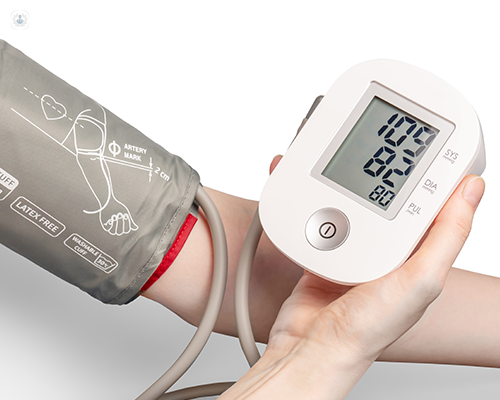Hypertension - Causes diagnosis and prevention
Written in association with:Blood pressure is the volume at which blood is pumped around the body by the heart. If blood pressure is too high (hypertension), it can cause serious problems for the body. Dr Mudalagiri gives us the lowdown on the risks of high blood pressure, and what we can do to avoid it.

Blood pressure is recorded using two sets of numbers, written in a form similar to a fraction and is measured in millimetres of mercury (mmHg). The top number, known as systolic pressure, measures the amount of pressure the heart generates in the arteries when it contracts. The bottom number, known as diastolic pressure, measures the amount of pressure in your arteries when your heart is resting between beats. So, for example, if your blood pressure reading shows 100/90mmHg (read as “100 over 90”), it means the systolic pressure is 100, while the diastolic pressure is 80.
Is high blood pressure a big problem?
According to figures provided by the British Heart Foundation, roughly fifteen million people in the UK have high blood pressure, with over half believed to be undiagnosed. Unfortunately, there are no symptoms for high blood pressure until it´s too late, people usually only find out they have it once they suffer something serious like a stroke, heart attack or kidney failure.
How is it diagnosed?
While a single high blood pressure reading is not a cause for concern, multiple readings over 140/90mmHg are a big indicator that someone may be in danger. In this case, your doctor will suggest some lifestyle changes which can help lower your blood pressure.
Who is at risk?
The chances of high blood pressure are higher for those who are overweight, smoke, drink excessive amounts of alcohol or don’t exercise enough. In addition, other factors like stress and family history can also have an impact. Age also plays a big part, systolic blood pressure rises due to large arteries getting stiffer as we get older. Because of all these factors, it’s important for everyone to be aware of their blood pressure and make the necessary lifestyle changes to give yourself the best chance of not suffering from high blood pressure now or in the future.
Which health problems are caused by high blood pressure?
• Heart failure – When the heart struggles to pump blood around the body sufficiently, which leads to heart attacks.
• Plaque disease – Build-up of fatty tissue in the arteries. • Kidney disease – High blood pressure can damage the kidneys vessels and filters, so they stop getting rid of waste properly.
• Stroke – High blood pressure responsible for almost fifty per cent of the strokes (Which can lead to brain damage) and heart attacks in the UK.
• Eyes – It can also cause damage to retinal blood vessels.
Can I prevent it?
Dietary changes like reducing salt intake, and eating fruit and vegetables can help. Exercise, maintaining a healthy weight and reducing stress are also proven to keep blood pressure at a healthy level.
What tests do I need?
Cholesterol, blood sugar levels, heart rate and urine are all good indicators of blood pressure, so testing them can help you spot any potential issues.
What can I do to manage my blood pressure?
Changing your lifestyle with a healthy diet and plenty of exercise is the first step. If that isn’t enough, medication can also help.
Dr Naveen Mudalagiri is a highly experienced consultant cardiologist in London and Kent, you can request an appointment with him by visiting his profile.


